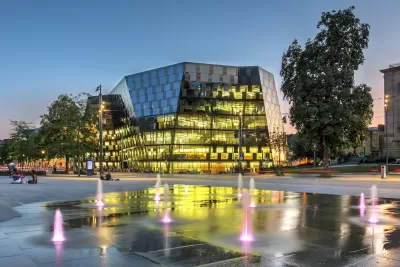A German research team used AI to understand how thermal stress will impact urban infrastructure down to the street level.

A project from the University of Freiburg in Germany assessed how researchers can use artificial intelligence to model the impacts of climate change and calculate ‘thermal stress’ on local infrastructure down to the street level.
According to an article on Phys.org, the model estimates how heat and thermal stress will impact facilities. “In a simulation as well as on the basis of interviews with representatives from various departments of Freiburg's city administration, the researchers also studied where the project's AI-based tools could actually be put to good use in urban planning, what opportunities, risks, and challenges this would involve, and how the tools should be further adapted for practical use.”
The article adds, “The model still needs to be merged with data on the vulnerability of individual urban spaces, but it can already be used now to evaluate urban planning measures such as the unsealing of surfaces. In addition, the researchers developed a novel method for automatically determining where to plant trees in a neighborhood to achieve the maximum reduction of thermal stress.”
FULL STORY: How cities can use AI to adapt to climate change

Montreal Mall to Become 6,000 Housing Units
Place Versailles will be transformed into a mixed-use complex over the next 25 years.

Planetizen Federal Action Tracker
A weekly monitor of how Trump’s orders and actions are impacting planners and planning in America.

DARTSpace Platform Streamlines Dallas TOD Application Process
The Dallas transit agency hopes a shorter permitting timeline will boost transit-oriented development around rail stations.

Chicago Transit: $770M Shortfall, 40% Service Cuts Loom
Despite dire warnings from transit officials, the Illinois General Assembly ended its legislative session without a solution.

Without International Immigrants, the Rural US Population Would Be Falling 58%
Census data shows that population growth in rural areas is due in large part to international migrants.

Dead End: Nine Highways Ready for Retirement
The Freeways Without Futures report describes the nation’s most promising highway removal proposals.
Urban Design for Planners 1: Software Tools
This six-course series explores essential urban design concepts using open source software and equips planners with the tools they need to participate fully in the urban design process.
Planning for Universal Design
Learn the tools for implementing Universal Design in planning regulations.
City of Mt Shasta
City of Camden Redevelopment Agency
City of Astoria
Transportation Research & Education Center (TREC) at Portland State University
City of Camden Redevelopment Agency
Municipality of Princeton (NJ)
Regional Transportation Commission of Southern Nevada





























